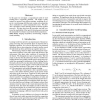Free Online Productivity Tools
i2Speak
i2Symbol
i2OCR
iTex2Img
iWeb2Print
iWeb2Shot
i2Type
iPdf2Split
iPdf2Merge
i2Bopomofo
i2Arabic
i2Style
i2Image
i2PDF
iLatex2Rtf
Sci2ools
128
click to vote
INTERSPEECH
2010
2010
Active word learning under uncertain input conditions
In this paper we investigate a computational model of word learning that is cognitively plausible. The model is partly trained on incorrect form-referent pairings, modelling the input to a word-learning child that may contain such mismatches due to inattention to a joint communicative scene. We introduce a procedure of active learning, based on attested cognitive processes. We then show how this procedure can help overcome the unreliability of the input by detecting and correcting the mismatches by reliance on previously built up experience.
Computational Model | Incorrect Form-referent Pairings | INTERSPEECH 2010 | Joint Communicative Scene | Signal Processing |
Related Content
| Added | 18 May 2011 |
| Updated | 18 May 2011 |
| Type | Journal |
| Year | 2010 |
| Where | INTERSPEECH |
| Authors | Maarten Versteegh, Louis ten Bosch, Lou Boves |
Comments (0)

